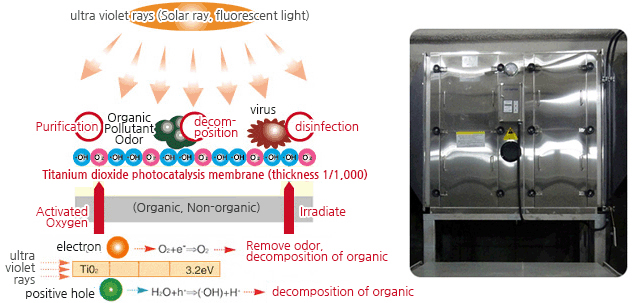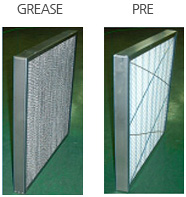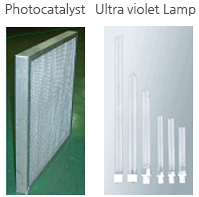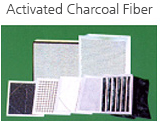
UV Photocatalyst Air Purification
Description
An odor is caused by one or more volatilized chemical compounds generally at a very low concentration. It is percieved by the sense of olfaction, and its effect are vary by individuals. That is why it is treated one of the most particular air pollution to solve. Odor is caused by a main generating source facility and damages by the source spreads around the area or even spreads wider by instable climatic condition.
UV photocatalyst air purification
The UV photocatalyst air purifier is based on photo catalytic oxidation, and an emerging air purifier technology that converts fine particles and toxic gasses into safer compounds. When UV light shines on the titanium dioxide, electrons are released at its surface. It's the electrons that do the useful work for us. The electrons interact with water molecules (H2O) in the air, breaking them up into hydroxyl radicals (OH−), which are highly reactive, short-lived, uncharged forms of hydroxide ions (OH−). These small, agile hydroxyl radicals then attack bigger organic pollutant molecules, breaking apart their chemical bonds and turning them into harmless substances such as carbon dioxide and water.
Process Diagram

Composition of System
| Pretreatment | UV photocatalyst oxidation reaction Treatment | Post Treatment |
|---|---|---|
 |
 |
 |
| Removal of water and oil | Removal of VOCs | Removal of odor and gas |
| Removal of dust | Reaction by ultraviolet rays (Tio2) | Adhesion by activated charcoal filter |
Comparision table between photocatalyst and activated charcoal deodorizer
| Classification | photocatalyst | Activated charcoal deodorizer |
|---|---|---|
| Composition | Grease, PRE, photocatalyst, ultraviolet rays, Activated Charcoal | Activated charcoal |
| Principle | Deodorization by photo catalyst | Adhesion by activated charcoal |
| Effect | ≤100 | ≤200 |
| Benefit | High effectiveness and less maintenance cost | Less initial cost and easier maintenance costs |
| Weakness | Cost for exchanging lamp and electricity | High maintenance fee and low effectiveness |
Application
| Classification | Type |
|---|---|
| Kitchen | Bakeries, Food courts, Family restaurants, Hotels etc. |
| Septic Tank | Apartments, Complexes, Facilities, schools, etc. |
| Wastewater/Sewage | Wastewater Treatment facilities, Sewage Treatment Facilities, etc. |
| laboratory | Universities, Research Institutes, etc. |

